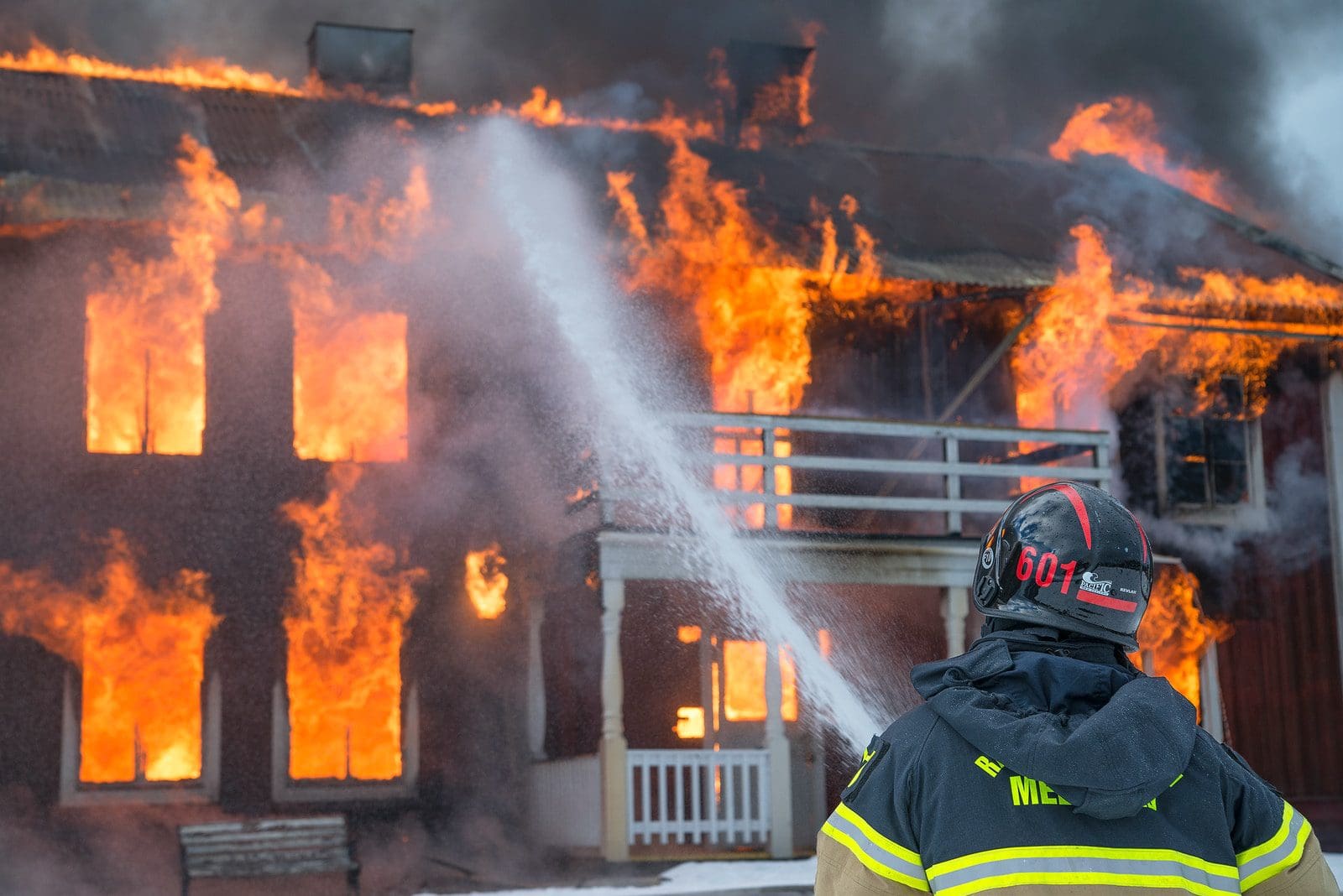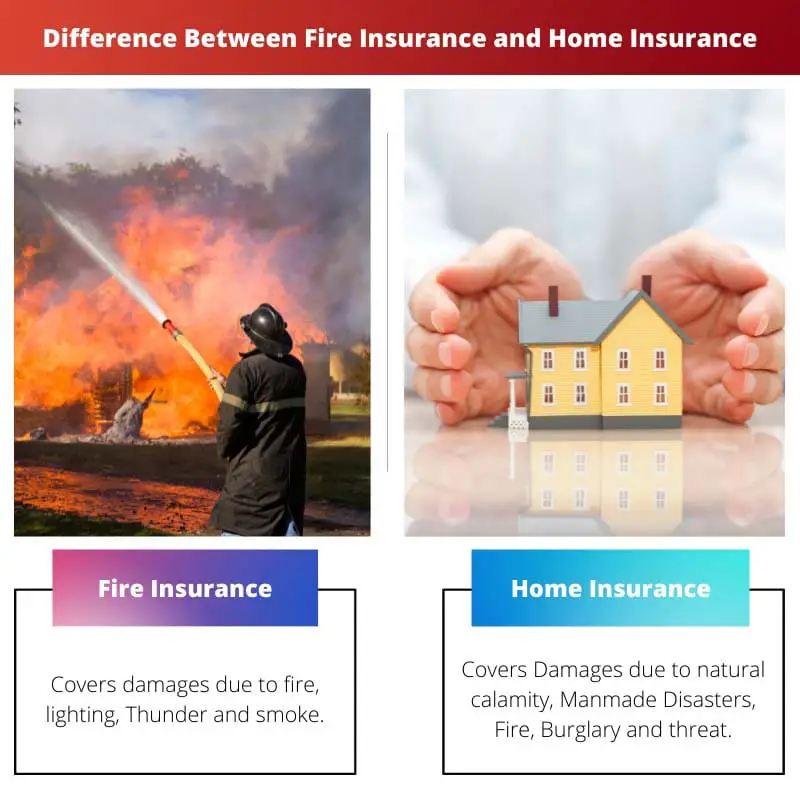Home insurance provides coverage for various perils such as fire damage, but fire insurance specifically focuses on protection against fire-related risks. While home insurance offers broader coverage for a range of incidents like theft or liability, fire insurance is more specialized, offering targeted protection against fire damage specifically. Depending on the homeowner’s needs and location, they may opt for either or both to ensure comprehensive protection for their property.
Key Takeaways
- Fire insurance exclusively covers damages caused by fire, including smoke and secondary damage from extinguishing efforts.
- Home insurance is a comprehensive policy that covers multiple perils, including fire, theft, natural disasters, and liability.
- Home insurance includes personal property protection and temporary living expenses, whereas fire insurance does not.
Fire Insurance vs Home Insurance
The difference between Fire Insurance and Home Insurance is that fire insurance compensates for damage caused by fire, lighting, Thunder and Smoke, which happens only due to fire. At the same time, Home insurance covers damages due to natural calamities, Manmade Disasters, Fire, burglary and others.

If there is a fire accident and it damages the property, then it can be claimed using fire insurance. The repair expense and reconstruction expenses are also covered by fire insurance.
It also covers the damages caused to third-party property or livelihood due to fire. Any natural or artificial disaster to the home property can be claimed using Home Insurance.
It offers the property financial security and covers the liabilities inside the house.
Comparison Table
| Feature | Fire Insurance | Home Insurance |
|---|---|---|
| Coverage | Primarily covers damage caused by fire, lightning, and explosion | Covers a wider range of perils, including fire, lightning, explosion, theft, vandalism, wind, hail, water damage, and more (specific coverage varies by policy) |
| Protection for | Primarily protects the structure of the building (walls, roof, etc.) | Protects the structure of the building, as well as contents inside the home (furniture, appliances, electronics, etc.) |
| Additional Coverages | May offer limited additional coverages, like temporary living expenses after a fire | May offer additional coverages like personal liability protection, medical payments, and coverage for valuable items (jewelry, artwork) |
| Cost | Typically less expensive than home insurance due to narrower coverage | Generally more expensive than fire insurance due to broader coverage |
| Purpose | Provides basic protection against fire damage for homeowners or property owners | Offers comprehensive protection for homeowners against a variety of perils, ensuring financial security in case of various unfortunate events |
What is Fire Insurance?
Coverage and Scope
Fire insurance typically covers damage caused directly by fire, including structural damage to buildings, as well as contents such as furniture, appliances, and personal belongings. Additionally, it may extend to cover damages caused by smoke, soot, and water used to extinguish the fire. Some policies may also include coverage for additional living expenses if the insured property becomes uninhabitable due to fire damage.
Exclusions and Limitations
While fire insurance provides essential protection against fire-related risks, it often comes with exclusions and limitations. Common exclusions may include damages caused by arson, acts of war, or intentional acts by the policyholder. Additionally, insurers may impose coverage limits based on factors such as the value of the insured property and the policy’s terms and conditions.
Importance and Considerations
Fire insurance is crucial for homeowners, renters, and businesses alike to mitigate the financial impact of fire damage. It provides peace of mind knowing that one’s property and possessions are protected against one of the most common and devastating perils. When purchasing fire insurance, it’s essential to carefully review the policy terms, coverage limits, deductibles, and exclusions to ensure adequate protection tailored to individual needs and circumstances.

What is Home Insurance?
Coverage Components
- Dwelling Coverage: This component of home insurance protects the physical structure of the home itself, including the walls, roof, foundation, and attached structures such as a garage or deck. It provides coverage for repair or rebuilding costs in the event of damage caused by covered perils, such as fire, windstorms, or vandalism.
- Personal Property Coverage: Home insurance extends coverage to personal belongings within the home, including furniture, appliances, electronics, clothing, and other valuables. This coverage reimburses homeowners for the cost of repairing or replacing these items if they are damaged, stolen, or destroyed by covered events.
- Liability Protection: Home insurance includes liability coverage, which protects homeowners against lawsuits and financial claims arising from bodily injury or property damage caused to others on their property. This coverage helps pay for legal expenses, medical bills, and settlement costs if a visitor is injured or their property is damaged due to the homeowner’s negligence.
- Additional Living Expenses (ALE): In the event that a covered peril renders the home uninhabitable, home insurance policies often include coverage for additional living expenses. This helps homeowners pay for temporary lodging, food, and other essential expenses while their home is being repaired or rebuilt.
Types of Policies
- HO-3 Policy: The most common type of home insurance policy, HO-3 provides comprehensive coverage for the dwelling and personal property against all perils except those specifically excluded in the policy.
- HO-5 Policy: This policy offers broader coverage than HO-3, typically including coverage for personal belongings on an open-peril basis, meaning they are covered for all perils unless explicitly excluded.
- HO-6 Policy: Designed for condominium owners, HO-6 policies provide coverage for the interior structure of the unit, personal belongings, and liability protection, while the condominium association’s master policy typically covers the building’s exterior.
Importance and Considerations
Home insurance is essential for homeowners as it helps protect their most significant investment and provides financial security against unexpected events. When purchasing home insurance, it’s crucial to consider factors such as coverage limits, deductibles, exclusions, and optional endorsements to tailor the policy to individual needs and ensure adequate protection against potential risks. Regularly reviewing and updating the policy is also important to reflect changes in the value of the home and personal belongings, as well as evolving insurance needs. By understanding the coverage components and policy options available, homeowners can make informed decisions to safeguard their homes and assets effectively.

Main Differences Between Fire Insurance and Home Insurance
- Here are the main differences between fire insurance and home insurance:
- Coverage Focus:
- Fire Insurance: Specialized coverage primarily focusing on protection against fire-related risks.
- Home Insurance: Comprehensive coverage that includes protection against various perils beyond fire, such as theft, liability, and natural disasters.
- Scope of Coverage:
- Fire Insurance: Typically covers damage caused directly by fire, smoke, and related perils.
- Home Insurance: Covers a broader range of risks, including fire damage, structural damage, personal belongings, liability, and additional living expenses.
- Policy Types:
- Fire Insurance: Usually offered as a standalone policy or as a component within a broader home insurance policy.
- Home Insurance: Offered in various policy types (e.g., HO-3, HO-5, HO-6), providing comprehensive coverage for homeowners, renters, and condominium owners.
- Exclusions and Limitations:
- Fire Insurance: May have fewer exclusions related to fire damage but might have limitations on coverage for other perils.
- Home Insurance: Typically includes exclusions and limitations specific to various perils and coverage components beyond fire, such as flood, earthquake, or intentional acts.
- Applicability:
- Fire Insurance: Suitable for individuals or businesses primarily concerned about fire risks or those seeking specialized coverage.
- Home Insurance: Suitable for homeowners, renters, and condominium owners seeking comprehensive protection for their property, belongings, and liability exposure against a wide range of risks.

- https://scholarship.law.cornell.edu/cgi/viewcontent.cgi?article=1335&context=clr
- https://thebhc.org/sites/default/files/beh/BEHprint/v027n1/p0091-p0101.pdf

I really enjoyed reading this. The article gets directly to the point and is highly informative.
Definitely, Emily. This article serves as a great resource for understanding insurance policies.
I agree, Emily. It’s an educational piece.
I was really expecting this article to include some more details about the premium rates of both types of insurance. It would have made it more comprehensive.
You’re right, Lcampbell. The premium rate is quite an essential aspect that should have been covered in this article.
The comparison table provided here simplifies the distinguishing criteria between fire and home insurance. It’s very practical for readers.
Absolutely, Jstewart. It’s an excellent way to present comparisons effectively.
I didn’t find this article very engaging. It needs to be presented in a more captivating manner to keep the readers’ interest.
I expected a more in-depth analysis of the legal aspects of insurance policies. This article seems to only scratch the surface.
The insights shared in this article are foundational for anyone wanting to comprehend the basics of insurance policies. It’s a great resource.
Indeed, Rosie. The information here is vital for all readers.
I couldn’t agree more, Rosie. It’s an educational read.
I was hoping this article would have a more light-hearted, comical approach to discussing insurance, but it’s still quite helpful.
I understand what you mean, Omorris. A bit of humor can go a long way in presenting serious topics like this.
The details provided here are comprehensive, making it easy to understand the nuances of these insurance types.
Absolutely, Shannon22. The explanations are very thorough.
Yes, I appreciate how the article offers clarity on the topic.
This article highlights a crucial comparison between fire and home insurance policies. It’s very insightful.
Absolutely, Qmurray. It’s always helpful to understand the differences between the types of insurance to make informed decisions.
This article is really informative and makes it very clear the difference between Fire Insurance and Home Insurance. It’s a great read for anyone who wants to learn about this topic.
Couldn’t agree more with you, Amelia. It’s great to have this kind of information explained thoroughly.
Yes, it’s a very well-written article. I found it extremely beneficial.